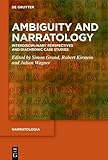Ambiguity and Narratology : Interdisciplinary Perspectives and Diachronic Case Studies / ed. by Simon Grund, Robert Kirstein, Julian Wagner.
Material type: TextSeries: Narratologia : Contributions to Narrative Theory ; 92Publisher: Berlin ; Boston : De Gruyter, [2024]Copyright date: 2024Description: 1 online resource (VIII, 276 p.)Content type:
TextSeries: Narratologia : Contributions to Narrative Theory ; 92Publisher: Berlin ; Boston : De Gruyter, [2024]Copyright date: 2024Description: 1 online resource (VIII, 276 p.)Content type: - 9783111495835
- 9783111502700
- 9783111502618
- online - DeGruyter
- Issued also in print.
| Item type | Current library | Call number | URL | Status | Notes | Barcode | |
|---|---|---|---|---|---|---|---|
 eBook
eBook
|
Biblioteca "Angelicum" Pont. Univ. S.Tommaso d'Aquino Nuvola online | online - DeGruyter (Browse shelf(Opens below)) | Online access | Not for loan (Accesso limitato) | Accesso per gli utenti autorizzati / Access for authorized users | (dgr)9783111502618 |
Frontmatter -- Editors’ Preface -- Contents -- I Introduction -- Foreword – Why Ambiguity and Narratology? -- Ambiguous Narration – Narrative Ambiguity: Theoretical Reflections on Terms and Concepts -- II ‘Text’ and ‘Text’-Producers -- Beyond the Text: The Performative Mediality of Ovid’s Metamorphoses -- The Author’s Speech: Empirical Perspectives on Speaker Attribution in Narrative Fiction -- III ‘Story’ and Narrative Devices -- Time and Ambiguity: Aesthetic Temporalities and the Ambiguity of Event in Goethe’s Wilhelm Meisters Wanderjahre oder die Entsagenden -- Poisonous Rumours: Creating Ambiguity in Death-Scenes in Tacitus’ Annals -- IV ‘Fabula’ and the Narrative Content of Fictional Worlds -- Visual Narration and Ambiguity: Two Case Studies -- It Might Be Not Impossible: Negation, Ambiguity and the Role of the Narrator in Early-Modern Utopian Narrations -- Facing The Other: Ambiguous Story Worlds in the Fiction of Susanna Clarke -- V Narration and Communication -- Ipse Dixit: (Dis)Ambiguating Quotations in Suetonius’ Lives of the Caesars -- ‘If Anyone Among this People …’: Ambiguity and Multiple Addressing in Latin Literature (Plautus, Catullus, Ovid, Thomas Morus) -- List of Authors -- Index
restricted access online access with authorization star
http://purl.org/coar/access_right/c_16ec
As a well-known phenomenon in everyday communication, ambiguity has increasingly become the subject of interdisciplinary research in recent years. However, within this context, it has been observed that words or expressions situated within the artistic framework of storytelling have not yet been at the centre of research interest. This book aims to bridge this gap by examining the phenomenon of ambiguity from the perspective of narratology – understood as a general theory of narration and narrative communication. The volume pursues two goals: Firstly, it seeks to demonstrate that the interdisciplinary combination of linguistics, cultural history and narratology enriches the field of literary studies significantly. This focus not only highlights how narrative techniques often rely on everyday language conventions, but also explores how various textual features, narrative devices, or even entire storylines can be affected by phenomena (or lead to experiences) of ambiguity. These ambiguities often serve as poetic strategies that are deliberately set in the communicative process of text and reader to achieve certain narrative goals. Secondly, ambiguity – as a characteristic of (narrative) communication – seves as a linking element across different fictional (and factual) text types and genres throughout time and cultures. The collected essays cover a wide range of narrative texts, from Roman comedy to funerary reliefs, from historiographical writings to utopian tales, from Goethe’s novels to contemporary fantasy literature. In its broad approach, the volume thus contributes to the project of diachronic narratology, which, like the research on ambiguity in literary and cultural studies, has recently gained increasing momentum. The combined consideration of ambiguity and narratology not only raises awareness of phenomena of ambiguity in narrative texts but also encourage reflection on the theoretical foundations of narrative, particularly on the methods and devices used to describe these ambiguous structures. Overall, the volume represents an exploration of a relatively unexplored interdisciplinary field, aiming to stimulate further research.
Issued also in print.
Mode of access: Internet via World Wide Web.
In English.
Description based on online resource; title from PDF title page (publisher's Web site, viewed 20. Nov 2024)


